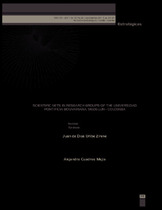| dc.contributor.author | Uribe Zirene, Juan de Dios | |
| dc.contributor.author | Cuadros Mejía, Alejandra | |
| dc.coverage.spatial | Seccional Medellín | spa |
| dc.date.accessioned | 2021-01-25T20:09:56Z | |
| dc.date.available | 2021-01-25T20:09:56Z | |
| dc.date.issued | 2011 | |
| dc.identifier.issn | 1794-8347 | |
| dc.identifier.uri | http://hdl.handle.net/20.500.11912/7587 | |
| dc.description | p. 213 - 224 | spa |
| dc.description.abstract | En la actualidad, la generación de conocimiento y de nuevas tecnologías se ha convertido en uno de los principales dinamizadores de las economías mundiales. Es en este punto en donde las redes científicas como mecanismo de cooperación han tomado relevancia. Dichas redes hacen referencia a un conjunto de instituciones e investigadores asociados, los cuales tienen como interés mutuo la consecución de objetivos y resultados previamente acordados con relación a un problema científico específico. A través de esta investigación se realizó una caracterización de las principales redes científicas en las cuales participan los investigadores de la UPB Sede Medellín-Colombia con el fin de obtener un diagnóstico de cada una de ellas y medir su impacto en cuanto a producción científica. De igual forma se emplearon algunos indicadores bibliométricos con datos obtenidos de la base de datos Scienti de Colciencias, para establecerer el índice de colaboración de los investigadores bolivarianos en el periodo 2000-2009. Finalmente se estudiaron los resultados de Moya, F. (2010) quién también presenta estadísticas de cooperación para la UPB y se compararon con los estudios realizados constatando la diversidad de información y de posibilidades de interpretación y análisis. | spa |
| dc.description.abstract | Currently, knowledge generation and new technologies have become the main boosters of global economies. Under these conditions, the scientific nets acquire the status of a cooperation mechanism. Such nets refer to a group of institutions and associated researchers that have the mutual interests of achieving goals and which results of a specific scientific problem previously agreed. This research characterizes the main scientific nets where researchers of UPB (Campus Medellin, Colombia) participate, and aims to diagnose each net and measure their scientific production impact. In addition to this, bibliometric indicators used were based on the Scienti – Colciencias database in order to establish the cooperation index of Bolivarian researchers in the period 2000-2009. Finally, the results by Moya (2010) were studied given that they show cooperation statistics for UPB and were compared with the performed studies, which allowed the verification of the diversity of information and the multiple possibilities of interpretation and analysis. | spa |
| dc.format.mimetype | application/pdf | |
| dc.language.iso | spa | |
| dc.publisher | Universidad Pontificia Bolivariana | spa |
| dc.relation.ispartof | Revista Ciencias Estratégicas | spa |
| dc.rights | Attribution-NonCommercial-NoDerivatives 4.0 International | * |
| dc.rights.uri | http://creativecommons.org/licenses/by-nc-nd/4.0/ | * |
| dc.subject | Redes científicas | spa |
| dc.subject | Cooperación científica | spa |
| dc.subject | Indicadores bibliométricos | spa |
| dc.subject | Scientific Nets | spa |
| dc.subject | Scientific Cooperation | spa |
| dc.subject | Bibliometric Indicators | spa |
| dc.title | Las redes científicas en los grupos de investigación de la Universidad Pontificia Bolivariana, sede Medellín - Colombia | spa |
| dc.title.alternative | Scientific nets in research groups of the Universidad Pontificia Bolivariana, Medellín - Colombia | spa |
| dc.type | article | spa |
| dc.rights.accessRights | openAccess | spa |
| dc.type.hasVersion | publishedVersion | spa |
| dc.description.sectional | Medellín | spa |
| dc.identifier.instname | instname:Universidad Pontificia Bolivariana | spa |
| dc.identifier.reponame | reponame:Repositorio Institucional de la Universidad Pontificia Bolivariana | spa |
| dc.identifier.repourl | repourl:https://repository.unab.edu.co/ | |


